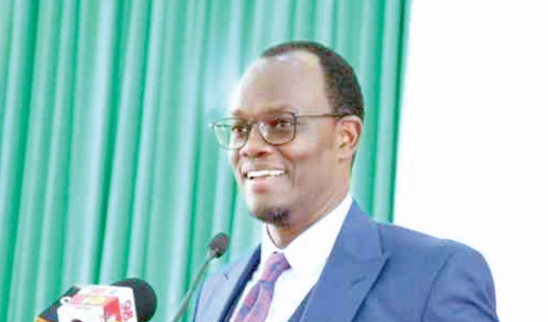Justice system agencies suffer from Sh100b cash deficit

Acting Chief Registrar of the Judiciary Paul Ndemo has revealed the justice system institutions are in crisis over the Sh100 billion funding deficit.
Speaking during a consultative meeting held in Mombasa yesterday by all heads of justice system actors and government officials including Chief Justice Martha Koome, he told the National Council on the Administration of Justice (NCAJ) that the justice sector agencies are facing systemic failure because of lack of sufficient funds.
Ndemo stated that the justice sector agencies which include the Judiciary, Office of the Attorney General, Office of the Director of Public Prosecutions(ODPP), Ethics and Anti-Corruption Commission (EACC) and the National Police Service (NPS) are facing financial problems and urged the government to increase funding adding that the same is vital to keep the agencies functioning.
“We need a re-think about funding this particular sector. Sh100 billion in our view in the larger scheme of things for an entire sector is a crucial amount of money to support the justice sector,” the acting Chief Registrar of the Judiciary Paul Ndemo told a meeting of the NCAJ.
Other under-funded agencies include the NCAJ itself, Kenya Prisons Service, Probation & Aftercare Department, the Independent Police Oversight Authority (IPOA), Witness Protection Agency and the National Council for Law Reporting among others.
The Registrar, who serves as the NCAJ Acting Secretary added that the justice sector agencies play a very critical role in ensuring the rule of law in the society is maintained, giving local and external investors confidence that matters are predictable and that justice is prompt.
“The justice sector plays a crucial role in preventing, investigating, prosecuting and adjudicating corruption cases and it is important that it should be properly funded,” Ndemo said.
Ndemo also said there is need for a supplementary budget to fund NCAJ and the anti-corruption agenda in the current FY totaling to Sh83 million and NCAJ bill at Sh18 million.
Apart from the financing shortfall to the individual justice sector agencies, the NCAJ is also facing a funding gap that stands at Sh285 million.
“The funding is to support deepened reforms, strengthening justice sector monitoring and evaluation, justice sector research and innovation, statutory council annual reporting and engagements, and grassroots administration of justice through Court User Committees,” said Ndemo.
The Director General, Budget, Fiscal & Economic Affairs at the National Treasury Albert Mwenda said the government was keen to support the justice sector given its critical role in economic development and the fight against corruption.
“If you have a strong justice system, we are able to support implementation of strategic government objectives and deliver on the socio-economic needs of the country,” Mwenda said.
On her side, Koome being the chairperson of NCAJ said there is a need to mobilise adequate resources in the justice sector to sustain the efforts to support the fight against corruption, enhanced accountability and efficient service delivery.
The NCAJ had convened a high-level statutory and crucial meeting to strategize about key issues affecting the delivery of services in Kenya’s justice sector.
In her speech , Koome noted that the justice sector’s resolve and will continue to be committed in scaling up efforts to combat corruption and reverse its adverse impacts on society.
In the meeting fourteen resolutions were reached in a bid measures to enhance seamless delivery of service to the Kenyan people.
Resolutions include promoting collective leadership in fighting corruption, prioritizing system examination in justice agencies, and taking remedial measures to prevent corruption opportunities.
Koome said that Corruption has been persisting as a complex national challenge and a sustainability threat that requires joint effort to fight.
“Corruption continues to compromise public institutions and adversely impact service delivery and economic growth of the country because it also undermines and erodes public trust,” the chief justice said.
Koome reiterated the justice sector’s determination and ongoing dedication to intensifying efforts to address corruption and mitigate its negative effects on society.
The Chief Justice noted that despite a series of critical interventions undertaken to combat corruption over time, the vice is evolving, hence the need for new approaches to address it.
“We are committed to improving our diverse but collective institutional cooperation mechanisms to address corruption and upscale practice imperatives to embed accountability in all our operations and functions,” she emphasized.
She noted that they also resolved to galvanize collective efforts to provide strategic and focused leadership boldly and decisively in the fight against corruption, prioritize systems and processes examination in justice sector agencies to identify corruption risk areas, and take remedial measures to seal opportunities for corruption.
The chief justice emphasized the need to enhance NCAJ’s coordination, improve arrests, investigation, prosecution, and trial processes, adopt efficient case management systems, and prioritize corruption and economic crimes cases.
Augment public engagement through Court user committees nationwide to address emerging challenges, rebuild public trust, and fast-track conclusion of anti-corruption cases at the grassroots level. “A framework and roadmap are needed to guide strategies for addressing corruption, enhancing accountability, and ensuring seamless service delivery, ultimately leading to a national anti-corruption conversation,”Koome said.
“We are mainly asking for inter-agency collaboration, cooperation, and coordination because no one agency can succeed in the fight against corruption, you need investigations, prosecution, and also the court that comes in to ensure that there is a fair and expeditious hearing,” she concluded.










